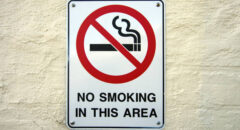
(BlackDoctor.org) — In the 21st century, more than 400,000 Americans still die each year from illnesses related to cigarettes. Taking into account the enormous amount of publicity given to the extremely harmful effects of cigarette smoking, Americans of all races, classes and backgrounds still light up each day.
According to the American Heart Association, cigarette smoking is “the most important preventable cause of premature death in the United States”, and approximately one out of every two smokers die of smoking-related illnesses.
Nasty Ingredients Abound
It’s no secret that cigarettes contain chemicals, additives and other ingredients that are dangerous, addictive, unhealthy, or clearly carcinogenic (cancer causing).
Of course, nicotine is the addictive ingredient in cigarettes that keeps you coming back for more, and when combined with the carbon monoxide also found in cigarettes, nicotine contributes to the decrease in blood circulation to the hands and feet that most smokers experience.
Carbon monoxide (which is also found in car exhaust, by the way) not only impacts circulation, but it also damages the heart, lungs and other organs by denying them the essential oxygen they need.
Tar is made up of a variety of chemicals, and one cigarette can contain from less than 7mg to more than 22 mg of tar. Tar stains teeth, hands and clothing, causes emphysema, lung cancer, bronchitis, impotence, osteoporosis, gum disease, tooth loss, and severely damages the cilia in the lungs (tiny hairs that act as filters and remove toxins).
Cigarettes and Cardiovascular Disease
In terms of cardiovascular disease, smoking increases blood pressure, decreases the ability to tolerate exertion or exercise, decreases lung capacity and elasticity, and makes the smoker more susceptible to dangerous blood clots. Smoking also decreases the levels of HDL (good) cholesterol, thus further exacerbating the risk of heart attack, stroke and other cardiovascular complications.
Cigarettes and Cancer
More than 40 carcinogenic ingredients have been identified in cigarettes sold in the United States, and those who smoke are much more likely to develop lung cancer than those who do not.
Both men and women who smoke are likely to develop cancers of the esophagus, lungs, bladder, tongue, nose, anus, throat, mouth and salivary glands, and men who smoke also have a much higher risk of cancer of the penis.
The connection between cigarette smoking and cancer is scientifically undeniable (despite the deceptively glossy and glamorous arguments made by many tobacco companies).
Cigarettes and Nutrition
If an individual smokes cigarettes, there are nutritional deficits that are generally unavoidable — particularly in the case of Vitamin C, an important antioxidant.
Antioxidants are substances that remove cancer-causing materials from the body and assist in important processes related to the disease prevention. Vitamin C also assists in the repair of damaged cells. In fact, the Vitamin C loss from smoking is paradoxical since your body needs that Vitamin C in order to fight against the damage that the cigarettes are doing to your body in the first place. Thus, cigarette smokers are advised to take at least 2,000 milligrams of Vitamin C per day until they are able to quit.
Smoking cigarettes also decreases the body’s ability to absorb Vitamin D, decreases calcium metabolism, and increases the levels of fat in the bloodstream.
Evidence also demonstrates that cigarette smokers are less likely to exercise, are more likely to indulge heavily in both caffeine and alcohol, eat a diet higher in fat, make poor dietary choices, and are less likely to have high quality restorative sleep. Taken all together, the nutritional profile of a cigarette smoker points towards poor health, poor choices, and a very high risk of preventable disease.
Children Copy What They See
When it comes to children, it is painfully apparent that children model their behavior on the demonstrated behavior of those around them. Exposure to adults who smoke almost inevitably arouses the curiosity of young and impressionable children. Moreover, images in the media that portraying smoking as acceptable and glamorous only add to the allure.
Children’s health is impacted by cigarettes in the same way as adults, although the damage can potentially be worse due to the fact that young bodies are still growing and developing. Aside from the obvious problem of nicotine addiction, the cilia in young lungs are highly susceptible to damage (albeit reversible), and the nutritional deficits caused by smoking can only negatively affect growth and development.
Why Not Quit Now?
There is no time like the present to stop smoking, and there are a plethora of programs available that will help you to do so. From acupuncture to medication for nicotine addiction, even support groups run by the American Lung Association, there are many avenues to a smoke-free life. While many smokers quit and relapse a number of times before finally giving up cigarettes for good, you are actually still giving your body a chance to recover every time you take a break from smoking. If you quit smoking, even temporarily, the cilia begin to grow back in your lungs, your lungs increase in their elasticity and exercise tolerance, and cardiovascular and cellular damage is slowly reversed.
While there’s no guarantee that previous cancer-related cellular changes in the body will be completely reversed, it is certain that for every cigarette not smoked, the chances of developing cancer or another life-threatening disease caused by smoking does indeed diminish.
Conclusion
Cigarettes represent a multi-billion dollar worldwide industry that contributes nothing to society other than the ultimate cost of the illnesses and health deficits caused by their use. Cigarettes are addictive and unhealthy, and have been linked to life-threatening diseases, even though movies and television continue to portray them as an essential aspect of the modern lifestyle.
The habit of smoking cigarettes reaches across socioeconomic and racial divides, and the addictive quality of nicotine knows no prejudice. Quitting smoking is a gift that you can give yourself (and your family) at any time of life, but the sooner you do so, the better. If you or a loved one can’t seem to quit, discuss the risks inherent in this unnecessary habit, and take that initial step towards a healthier life free of tobacco and its inevitable damage.








